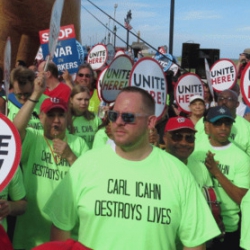
The casino workers staged protests over the loss of health and pension benefits, which caused Carl Icahn to accuse them of “intimidation”.
The U.S. Supreme Court is going to hear a bankruptcy dispute involving the Trump Taj Mahal, the Atlantic City casino which was owned by many years by the GOP’s presumptive presidential nominee, Donald Trump. The Taj’s new owner, Carl Icahn, is in a dispute with the casino’s workers over pension and health benefits.
At the heart of the case is whether labor laws should be held as sacrosanct, or whether judges should be allowed to ignore labor laws in order to reorganize a business. The idea of the reorganization is to allow distressed properties to remain in business. To many, judges have gone too far in the past few years in rewriting a hundred years of labor laws.
Collective Bargaining and the Law
In the case of the Trump Taj Mahal, labor laws state that the Local 54 of Unite-HERE has the right to collectively bargain with the Trump Taj Mahal. Those bargains maintained the Local 54’s health benefits and pension plans over the past 12 years, by negotiating away raises for the workers. Over that time, workers have received only an 80-cent raise in salaries.
Loss of Health and Pension Benefits
When Carl Icahn took over effective control of the Trump Taj Mahal in October 2014 (before he became its principal owner), he disputed the pension and health benefits for over 1000 workers in the Trump Taj Mahal. He filed a petition with a New Jersey judge, who in one decision did away with 12 years of labor negotiations. At the same time, the judge did away with the workers’ benefits.
As Unite-HERE’s general counsel, Richard M. McCracken, said in an interview recently, “This is about how a bankruptcy was used to transfer value from working people to the super-rich.”
Protests and Public Relations
The Local 54 has been outraged with the judge — and with Carl Icahn — ever since. When the case first happened, the workers protested outside the Taj. When Icahn took official control of the Trump Taj Mahal in early 2015, they protested outside the casino. Every few months, usually when a new negotiation begins or when some piece of bad news is announced by Carl Icahn, the workers have a rally outside of Icahn’s properties.
When the case went before the judge, Icahn filed with the Third Circuit Court of Appeals a “plan of reorganization [that] was contingent on the rejection of the collective bargaining agreement”. Icahn promised to give the casino a $100 million influx of cash, if the judge removed the onerous pension package.
Jane Roth Agreed with Icahn
Judge Jane Roth agreed with Icahn’s arguments, saying, “It is preferable to preserve jobs through a rejection of a CBA, as opposed to losing the positions permanently.”
Since then, Carl Icahn has found an excuse to back out of the $100 million promise. In April 2016, the Trump Taj Mahal’s new owner said he would renege on the promise to invest $100 million in the casino, if the North Jersey casino referendum passes in November 2016. He said the North Jersey casinos would draw capital away from Atlantic City, making the renovations useless.
Icahn Reneged on $100 Million Pledge
In lieu of those long-promised renovations, Carl Icahn did not promise to restore the health and pension benefits. Instead, he pleaded poverty for the casino, saying he would have a hard time maintaining profits, under the circumstances.
The only way to make Carl Icahn reverse his position is through legal proceedings, it would seem. Unite-HERE filed a petition with the National Labor Relations Board, asking for it to present the case to the Supreme Court. The board decided the case had merit and filed the appeal, arguing that longstanding labor laws state that the CBA’s remain in effect, even if a business goes through a bankruptcy.
Labor Relations Board Filing
The filing before the Supreme Court claims Carl Icahn did not negotiate in good faith. Instead, he held two negotiation meetings, then filed paperwork to disavow the collective bargaining agreement.
The filing states, “Trump [Entertainment] immediately implemented the changes in terms and conditions of employment that the Union had rejected.
“It ceased making contributions to the pension, health and welfare, and severance funds that provided benefits to Trump’s employees. It expanded its own authority to consolidate positions, assign work and subcontract, which resulted in layoffs and loss of pay.“
